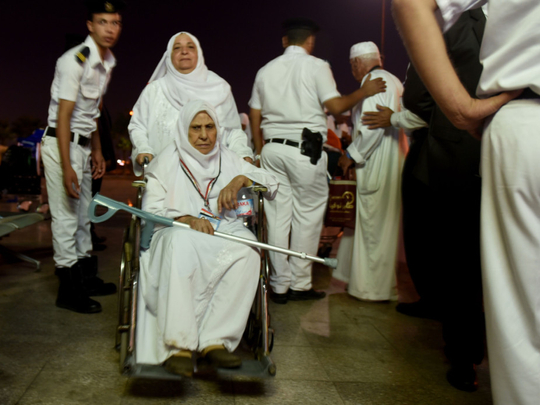
Cairo: Pilgrims have been saying their farewells at Cairo airport before leaving for Saudi Arabia to perform Haj in the tradition, they believe, of the Prophet Mohammad (PBUH) and Prophet Ebrahim before him.
Every year tens of thousands of Egyptians apply for visas to travel to Makkah to join more than a million Muslims from across the world at the pilgrimage.
“When I was chosen, I couldn’t believe it,” says Afaf Hassan Rifai, who was selected by Egypt’s authorities to perform Haj, which is to start early next month.
“I started crying and I prostrated to God,” she says, her beaming husband standing next to her outside the terminal late on Thursday.
Nearby a policeman pushes a wheelchair carrying an elderly women with a cane into the terminal.
Every Muslim who can undertake the journey is expected to perform the pilgrimage at least once in his or her lifetime, but it can also be performed on behalf of another follower of the faith who is unable to do so.
Muslims have travelled to Makkah for Haj since the seventh century, when God is believed to have ordained it in the Quran.
Last year, an estimated 2,300 pilgrims — among them 464 Iranians and 182 Egyptians — died in a stampede during Haj, according to tallies from foreign officials.
It was the deadliest stampede in Haj history, and Saudi authorities have announced new security measures for the Haj this year, including electronic bracelets and a reduced period for the stoning ritual during which the deaths took place.
But many Muslims still dream of going — even those who have already made repeated pilgrimages, such as 93-year-old Salem Ebrahim Rahmo.
“I’m happy as can be,” said the white-turbaned Rahmo as he waited outside the Cairo airport terminal.
“To visit the Prophet [tomb and mosque in Madinah], this is the greatest happiness. And to visit the Kaaba. This is my third time,” he says.
His son, Rahmo Mohammad Ebrahim, believes “everyone” would seize the chance to perform Haj if allowed.
“Every person wishes to visit the houses of God and to perform the pilgrimage and fulfil his obligation,” says Ebrahim, 53.
The rituals, believed to date to the time of Prophet Ebrahim — who Muslims believe built the original Kaaba as the first house of worship — will begin on September 9 and last for six days.
Men will wear seamless white clothes, and women modest Islamic garb, and circumambulate the Kaaba seven times.
They will walk between two neighbouring hills seven times, emulating, they believe, Prophet Ebrahim’s wife Hajar as she searched for water, then symbolically cast stones at the devil.
The cathartic ritual, which pilgrims believe cleanses them of sin, is “spiritual bliss”, says Ebrahim.
“There is nothing better than this.”











